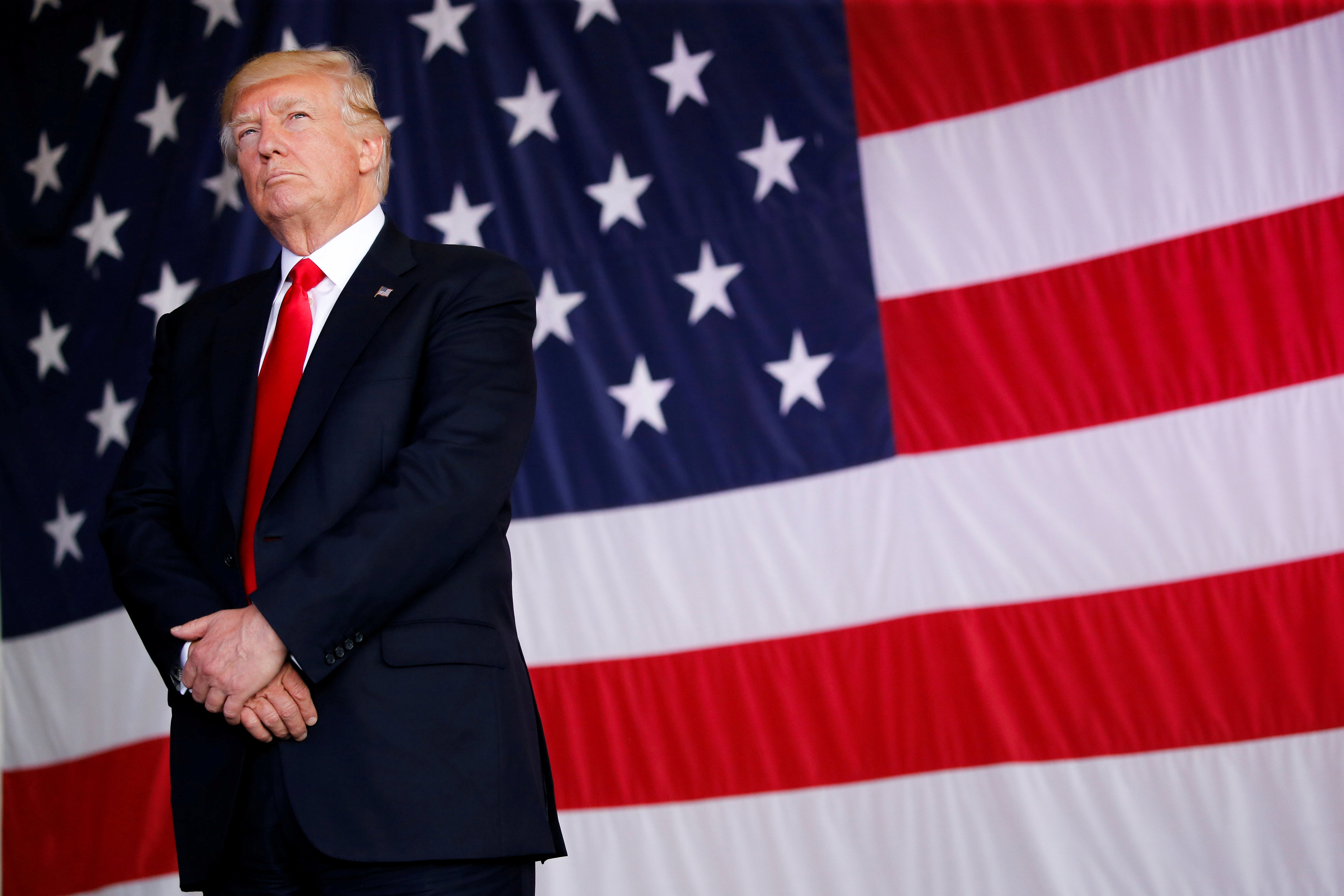 FILE PHOTO: U.S. President Donald Trump stands in front of a U.S. flag while listening to U.S. first lady Melania Trump give a speech to U.S. troops at the Naval Air Station Sigonella before returning to Washington D.C. at Sigonella Air Force Base in Sigonella, Sicily, Italy, May 27, 2017. REUTERS/Jonathan Ernst/File Photo
FILE PHOTO: U.S. President Donald Trump stands in front of a U.S. flag while listening to U.S. first lady Melania Trump give a speech to U.S. troops at the Naval Air Station Sigonella before returning to Washington D.C. at Sigonella Air Force Base in Sigonella, Sicily, Italy, May 27, 2017. REUTERS/Jonathan Ernst/File Photo US
Ross Douthat muses on the future of Pax Americana with Trump at the helm:
So we have a test: How well does American hegemony function when the colossus lacks a head? Is the basic structure of the Pax Americana — the weight of our military advantage, the geopolitical habits instilled by 25 years of unipolarity, the atrophy in other nations’ readiness for interstate conflict — strong enough to keep lesser powers out of major wars even if the president of the United States doesn’t understand his role or how to play it?
Fred Kaplan is afraid of the consequences of Trump’s ignorance:
Trump doesn’t know what he doesn’t know—and that’s the most dangerous kind of ignorant leader. Take the flare-up between the Gulf states and Qatar, which has a real potential of escalating to an all-out conflict between Iran and Saudi Arabia. The underlying tensions of this conflict have been brewing for some time, but the flare-up is entirely Trump’s doing. First, his speech in Riyadh encouraged the Saudis to step up their pressure on Qatar. Then, instead of sending his diplomats to calm matters, he took credit for the development in a tweet, in which he also tagged Qatar as a financier of terrorism—perhaps unaware that Qatar also hosts the United States’ largest military base in the region, home to 10,000 American troops and the Central Command’s air combat center.
Israel
Andrew Friedman writes about the settlers’ growing frustration with Netanyahu for not letting them build:
Samaria Regional Council head Yossi Dagan told Army Radio that it is “no secret” that the settlers are very disappointed with the fact that Netanyahu has not reversed building policy in the West Bank, especially after all the prime minister’s talk about “after Obama.”
“The prime minister promised us a rush of building after Obama left office, but he hasn’t kept his promises,” Dagan fumed. “We will no longer accept a situation in which a half-million Jews in Judea and Samaria, alongside 400,000 Jews and Israeli citizens in Jerusalem are treated as fourth-class citizens.”
Shlomi Eldar thinks Netanyahu and Abbas are on the same page for once:
That being said, when it comes to the PA, what is on the line is not the measure of trust between Abbas and Trump, but how Abbas is viewed by the Palestinian rank and file. Abbas will try to convince the Palestinians that wise, cautious and sagacious diplomacy on his part had stopped Trump from taking extreme, irreversible measures they oppose. Netanyahu will take the same approach with the settlers, telling them that wise diplomatic finesse will help him safeguard construction in the settlements.
Middle East
David Andrew Weinberg writes about the tense Saudi-Qatari dispute:
The Gulf monarchies face the most serious crisis in their history. It is largely being covered as a diplomatic spat, since several Arab nations terminated their relations with Qatar on Monday to protest its support for radical Islamists. But the crisis has an economic component as well. Saudi Arabia severed Qatar’s access to its only land border, across which roughly 40 percent of Qatar’s food needs are imported.
The story of how we got here dates back to 1990. It can be traced to Saudi Arabia and Qatar’s contrasting views on two dangerous forces: Iran and the Muslim Brotherhood.
Ilan Goldberg and Nicholas Heras take a look at how the US might be escalating its activities in Syria:
Yet, even as Washington potentially stumbles into war, there has been little public explanation from the highest levels of government, scant media coverage, and virtually no congressional oversight. This is no way to handle what could potentially mutate into a vastly expanded American military intervention in the Middle East.
Jewish Journal
Atar Hadari compares two classic pieces of liturgy that offer two visions of what Judaism is about:
As far as halakhah is concerned, you are not required to say either Yigdal or Adon Olam if you don’t want to—unlike the case with other parts of the liturgy that you have to find silent time for in the course of the service if you’re tardy getting to synagogue. But there they sit, giving two anthem-like views of what Judaism boils down to—one as a rational, daytime hymn and the other as a friendlier song that, even though the mortality of the laborer resigning body and soul to God is only hinted at, takes care to address the fears and weariness of night.
According to Cnaan Liphshiz, Jared Kushner’s family is the stuff of legend in a little town in Belarus:
In Novogrudok, the Kushners are remembered and revered — not for their Trump connections or their sprawling real estate empire, nor for the scandal that engulfed Kushner’s father, Charles, or the recent allegations that he proposed a back channel for communication between the Trump administration and Russia.
Rather, the Kushners are known for the daring escape from the local ghetto in one of the most famous acts of Jewish resistance to the Nazis.























 More news and opinions than at a Shabbat dinner, right in your inbox.
More news and opinions than at a Shabbat dinner, right in your inbox.